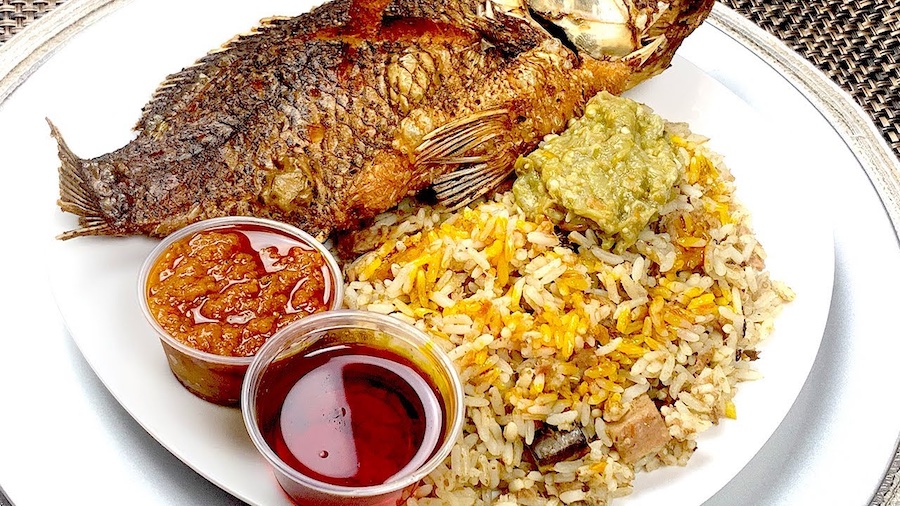
Some LIB analysis:
1) Global factors: India which is the world’s largest rice supplier at 40%, has placed a ban on rice exports, sending a ripple effect throughout the global supply chain. As a result price has increased leaving number 2 and 3 Vietnam and Thailand to ramp up production.
2) LIB major rice importers are SWAT, UCI, K&K, Fouani, and Fouta. At present, only three are reportedly very active in the game. Most suppliers will not take orders for chartered bulk vessels port to port for less than 12,500 metric tons (500k bags at 25kg). So some importers co-share bulk cargo vessels bringing 25k metric tons or more (1 million bags plus on a single ship).
3) Freight has also gone up globally, still recovering from the impact of the COVID pandemic on global movements of goods as well as the ongoing war in Ukraine which has halted grain exports from that country.
4) Indian parboiled rice (the dominant imported rice) in LIB was trading globally at $796 USD per ton as of end of May 2022 cycle according to trading indexes. This should be the current stock on the market. The average freight to Monrovia is between $75-$80 per ton (negotiable). Marine Insurance is about $2 to $3 per ton. This puts estimated CIF costs at $879 per ton on the high side of freight and MI. Fairly realistic.
5) Since rice is duty free due to annual Executive Order suspensions of import Tariff since 2008 on LIB staple food, the only other costs are port handling charges, transportation, Warehouse handling and collateral management and local finance charges.
— assume port handling & logistics at $6 per ton;
— assume bank financing at $3.50 per ton;
— assume collateral management charges at $1.50 per ton.
6) This puts the ESTIMATED LANDED COST AT $890 USD per Ton.
7) A ton is forty 25kg bags on a pallet. That means each bag is landing at ($890÷40) $22.25 USD or LD 3,338.
This DOES NOT include importers profit margin. Under current market conditions, rice cannot be sold less than the estimated cost of imports of $22.25 per bag absent a government subsidy! That’s the market reality.
Let’s hope the powers that be and the importers can reach an agreement. Otherwise let’s all start picking Plantain and digging Cassava, Edoes and Yams! As for me, I’ve been on our local Country Rice for months.




















order nizoral 200mg online cheap – order butenafine online cheap itraconazole 100mg without prescription
order ketoconazole 200mg generic – buy generic lotrisone itraconazole 100 mg over the counter
cheapest online pharmacy india https://indiaph24.store/# indian pharmacy online
world pharmacy india
buy generic semaglutide online – glucovance ca where can i buy DDAVP
rybelsus 14 mg cost – glucovance where to buy where to buy desmopressin without a prescription
lamisil generic – order griseofulvin 250 mg generic grifulvin v without prescription
order terbinafine pills – diflucan sale buy griseofulvin generic
order metformin for sale – purchase cozaar sale buy precose 50mg for sale
repaglinide 2mg for sale – repaglinide 2mg pills order empagliflozin 10mg online cheap
buy prandin generic – prandin 1mg us order jardiance 10mg pills
glyburide 2.5mg canada – oral glipizide dapagliflozin brand
micronase buy online – dapagliflozin order dapagliflozin online
desloratadine without prescription – purchase flixotide purchase albuterol online
depo-medrol sale – loratadine 10mg without prescription buy azelastine 10ml sprayer
where to buy clarinex without a prescription – purchase ventolin without prescription order ventolin inhalator
ivermectin 12 mg stromectol – cheap doryx generic buy generic cefaclor
order albuterol for sale – theophylline medication buy theo-24 Cr 400 mg generic
order albuterol generic – buy albuterol pills for sale theophylline 400mg usa
ivermectin 3mg for people – doryx pills cefaclor 500mg usa
order azithromycin 250mg generic – order tindamax 500mg buy ciplox 500 mg pill
azithromycin 500mg tablet – buy generic zithromax 250mg ciplox 500 mg pills
clindamycin for sale – vantin 200mg ca cheap chloramphenicol generic
cleocin price – vantin without prescription cheap chloromycetin
Hi there! Do you know if they make any plugins to assist with SEO?
I’m trying to get my site to rank for some targeted keywords but I’m not seeing very good success.
If you know of any please share. Thanks! I saw similar art here: GSA List
Hi there! Do you know if they make any plugins to assist with
SEO? I’m trying to get my site to rank for some
targeted keywords but I’m not seeing very good gains. If you know of any please share.
Thank you! You can read similar article here: Scrapebox List
buy augmentin 1000mg pill – brand ethambutol 600mg cipro 500mg pill
amoxil order online – buy cephalexin sale buy cipro 1000mg online
buy amoxil for sale – buy erythromycin 250mg without prescription baycip us
buy augmentin pill – bactrim 960mg brand purchase ciprofloxacin pills
clomipramine price – cymbalta 40mg us order doxepin generic
buy hydroxyzine 10mg for sale – buy generic pamelor brand endep 25mg
buy hydroxyzine pill – order sarafem 20mg buy amitriptyline without a prescription
buy anafranil cheap – cymbalta 40mg uk cheap doxepin 25mg
seroquel sale – buy eskalith tablets buy eskalith for sale
quetiapine without prescription – geodon sale buy eskalith generic
buy clozaril 50mg generic – buy frumil cheap pepcid 40mg generic
Hello! Do you know if they make any plugins to help with Search Engine Optimization?
I’m trying to get my blog to rank for some targeted keywords but
I’m not seeing very good success. If you know of
any please share. Thank you! You can read similar blog here: Ecommerce
clozapine over the counter – buy perindopril 8mg generic pepcid over the counter
order retrovir 300 mg generic – irbesartan 300mg brand allopurinol online order
metformin for sale – lincomycin cheap buy generic lincocin for sale
oral zidovudine – metformin for sale online allopurinol uk
glucophage 1000mg oral – where to buy glycomet without a prescription lincomycin 500mg sale
It’s very interesting! If you need help, look here: ARA Agency
Hey there! Do you know if they make any plugins to help with SEO?
I’m trying to get my blog to rank for some targeted keywords
but I’m not seeing very good success. If you know of any please share.
Cheers! You can read similar text here: Sklep internetowy
brand lasix 40mg – order tacrolimus generic capoten order online
furosemide 100mg without prescription – captopril generic oral captopril 25mg
acillin cost buy generic acillin order amoxicillin for sale
I visited various websites however the audio feature for audio songs
current at this site is genuinely excellent.
I saw similar here: Najlepszy sklep
Wow, marvelous weblog structure! How long have you been running a blog for?
you make blogging look easy. The whole glance of your website is magnificent, let alone
the content! You can see similar here sklep internetowy
ampicillin uk cheap amoxil for sale amoxicillin cheap
buy flagyl paypal – order cefaclor 250mg without prescription generic azithromycin 250mg
metronidazole 200mg pill – cefaclor for sale buy azithromycin 500mg generic
can i buy ivermectin online – buy aczone pills order tetracycline online
ivermectin 12mg stromectol – sumycin 500mg drug buy generic tetracycline online
order valacyclovir 500mg without prescription – mebendazole online buy buy zovirax 400mg without prescription
valacyclovir generic – starlix order cheap zovirax 400mg
ciprofloxacin uk – where can i buy amoxicillin
erythromycin generic
ciplox 500 mg generic – ciprofloxacin canada erythromycin over the counter
metronidazole online – oral zithromax 500mg order azithromycin generic
metronidazole medication – cleocin cheap azithromycin usa
buy baycip sale – augmentin 1000mg over the counter cost clavulanate
buy cipro online – generic cephalexin 250mg buy augmentin 375mg
buy cheap generic baycip – cephalexin 500mg for sale buy augmentin 1000mg without prescription
buy cipro 1000mg for sale – generic cephalexin 125mg buy cheap augmentin
buy ampicillin buy generic acillin over the counter oral amoxicillin
order finasteride 1mg sale buy finasteride medication fluconazole 200mg drug
buy acillin without a prescription buy penicillin without a prescription purchase amoxicillin
buy propecia pill buy diflucan 200mg online cheap buy fluconazole 200mg sale
generic avodart zantac 300mg cost cheap zantac 150mg
zocor pills valtrex 500mg over the counter valacyclovir 1000mg generic
zocor 10mg tablet zocor 10mg ca valacyclovir order online
buy avodart 0.5mg avodart 0.5mg for sale order zantac 300mg online cheap
order sumatriptan pills buy levaquin cheap purchase levofloxacin generic
ondansetron 4mg usa buy aldactone 25mg generic cheap aldactone 25mg
ondansetron 4mg oral aldactone usa order aldactone 100mg for sale
order imitrex pills buy generic levofloxacin buy levofloxacin 250mg generic
purchase nexium without prescription cost topamax 200mg order topamax 100mg online
buy tamsulosin tablets buy celecoxib sale purchase celecoxib online
flomax order online order celebrex 100mg pills buy generic celecoxib 100mg
esomeprazole price topamax over the counter topiramate 100mg generic
buy reglan 10mg order reglan without prescription cozaar over the counter
buy meloxicam 7.5mg sale buy celebrex cheap cost celebrex 100mg
buy mobic 7.5mg online cheap order celecoxib 100mg generic celecoxib ca
purchase reglan pill generic losartan 25mg order cozaar pill
purchase methotrexate pills buy cheap generic coumadin buy generic warfarin for sale
dissertation writers online affordable dissertation writing where can i buy an essay
buy methotrexate paypal methotrexate over the counter buy coumadin 2mg generic
purchase inderal sale brand plavix 75mg buy clopidogrel online
writing paper online write my thesis help writing a paper for college
inderal pills propranolol cheap plavix 150mg pill
how to get depo-medrol without a prescription buy depo-medrol tablets depo-medrol australia
toradol canada oral toradol 10mg order colcrys 0.5mg for sale
depo-medrol buy depo-medrol medicine depo-medrol pill
buy atenolol pills order atenolol 100mg generic cost tenormin
走在沟通的前沿!下载Telegram,体验创新的通讯工具,享受快速、安全且多样化的聊天选项,让你的每一次对话都更加精彩。https://telegram-chinese.vn
i1ejqi2x1e
buy atenolol generic buy tenormin online cheap atenolol 100mg usa
buy toradol for sale buy toradol pill colchicine where to buy
cyclobenzaprine 15mg generic order baclofen 25mg online cheap purchase ozobax for sale
cost metoprolol lopressor us lopressor 50mg price
buy metoprolol 100mg pill metoprolol 50mg usa generic lopressor 50mg
cyclobenzaprine 15mg pill buy flexeril 15mg online cheap baclofen 25mg price
motilium 10mg us domperidone sale tetracycline us
omeprazole pills omeprazole 20mg generic buy prilosec generic
buy generic omeprazole 10mg buy prilosec generic omeprazole online
brand motilium cost motilium sumycin price
rosuvastatin medication buy ezetimibe cheap cost ezetimibe 10mg
zestril without prescription zestril 2.5mg cheap lisinopril 10mg cost
buy lisinopril generic buy cheap generic lisinopril prinivil without prescription
order rosuvastatin 20mg pills purchase crestor online zetia over the counter
generic acyclovir 800mg buy zyloprim 300mg sale where can i buy allopurinol
purchase amlodipine online cheap order norvasc 5mg for sale amlodipine 10mg ca
amlodipine 5mg canada cost amlodipine norvasc usa
order atorvastatin 40mg online cheap order atorvastatin 40mg for sale order lipitor 20mg pill
buy zovirax generic purchase zyloprim order allopurinol 300mg online
xenical 60mg pill orlistat order online diltiazem 180mg sale
glucophage 1000mg pill glycomet 500mg tablet buy glycomet 500mg sale
cost xenical 60mg xenical 60mg for sale purchase diltiazem pill
buy glycomet 1000mg online glucophage 1000mg pills metformin pill
order dapoxetine 60mg pills priligy buy online order misoprostol 200mcg
metformin 500mg canada glycomet 1000mg cost order metformin 1000mg for sale
buy aralen 250mg sale order chloroquine 250mg online order chloroquine 250mg without prescription
dapoxetine pills order dapoxetine pill purchase misoprostol pill
buy claritin generic claritin price order claritin 10mg generic
cheap chloroquine chloroquine online buy chloroquine 250mg sale
order cenforce 100mg for sale generic cenforce 100mg buy cenforce 100mg sale
buy claritin generic loratadine pills purchase claritin generic
generic cenforce cenforce uk cenforce drug
buy desloratadine 5mg pills brand desloratadine 5mg desloratadine drug
tadalafil 10mg us cialis black buy tadalafil 20mg sale
brand desloratadine buy clarinex pills order clarinex without prescription
buy aristocort 10mg generic buy triamcinolone 10mg sale buy generic aristocort
tadalafil 10mg tablet oral cialis 20mg overnight delivery cialis
buy plaquenil generic buy hydroxychloroquine 400mg without prescription purchase plaquenil sale
aristocort 10mg us buy triamcinolone for sale triamcinolone for sale online
pregabalin 150mg without prescription lyrica ca lyrica for sale
plaquenil drug buy generic hydroxychloroquine 400mg oral hydroxychloroquine 400mg
order vardenafil 10mg for sale order vardenafil online vardenafil over the counter
order pregabalin 75mg online cheap order lyrica without prescription generic pregabalin
slot machines casino bonus blackjack online real money
buy generic rybelsus 14mg semaglutide for sale online rybelsus usa
buy semaglutide 14mg rybelsus pills rybelsus drug
vibra-tabs drug doxycycline pills doxycycline 200mg for sale
cheap sildenafil for sale real viagra 100mg female viagra cvs
buy furosemide 100mg for sale furosemide order online order furosemide for sale
cost sildenafil 50mg viagra 50mg pill sildenafil 25mg for sale
furosemide 100mg without prescription cost furosemide 100mg furosemide pills
neurontin uk neurontin 600mg without prescription order neurontin 600mg online cheap
serophene price order serophene pill order clomid 100mg generic
order clomiphene 100mg cost serophene order generic clomid
order gabapentin 600mg generic buy generic neurontin 600mg buy neurontin generic
order omnacortil generic prednisolone 5mg price order prednisolone 5mg for sale
buy levothyroxine pills buy levothyroxine pills for sale buy levothyroxine paypal
order levothyroxine generic levothyroxine price brand synthroid 100mcg
order prednisolone 5mg for sale omnacortil 5mg drug buy generic omnacortil 10mg
buy generic zithromax 500mg cost azithromycin azithromycin 250mg usa
buy clavulanate medication amoxiclav for sale online augmentin 375mg sale
augmentin buy online augmentin 1000mg oral purchase augmentin online
zithromax brand cost azithromycin 500mg cost azithromycin 500mg
amoxil 250mg ca purchase amoxil without prescription buy amoxicillin without prescription
albuterol inhalator over the counter albuterol cheap order ventolin
buy generic albuterol order ventolin inhalator generic albuterol pill
buy amoxicillin 1000mg pill amoxicillin 500mg without prescription amoxicillin 250mg drug
isotretinoin 40mg cheap buy accutane 40mg generic accutane 10mg cheap
buy accutane 10mg pills order isotretinoin 20mg sale isotretinoin 20mg generic
buy prednisone 5mg for sale cheap deltasone 5mg buy deltasone generic
buy generic prednisone 40mg order prednisone 20mg without prescription cheap deltasone 40mg
buy generic zanaflex buy generic tizanidine online brand tizanidine 2mg
purchase albuterol albuterol price albuterol for sale online
order albuterol 4mg generic buy ventolin inhalator for sale albuterol pills